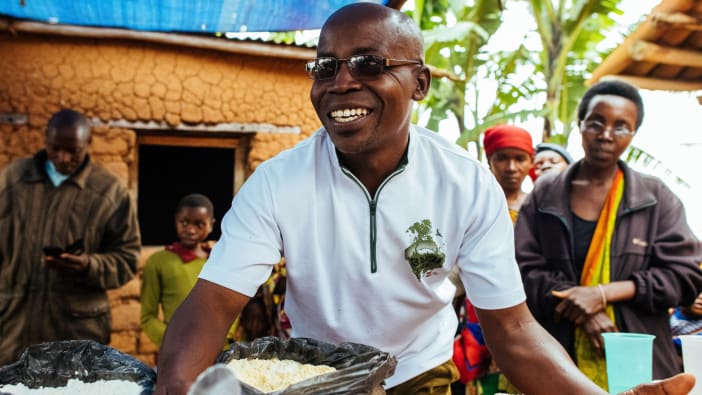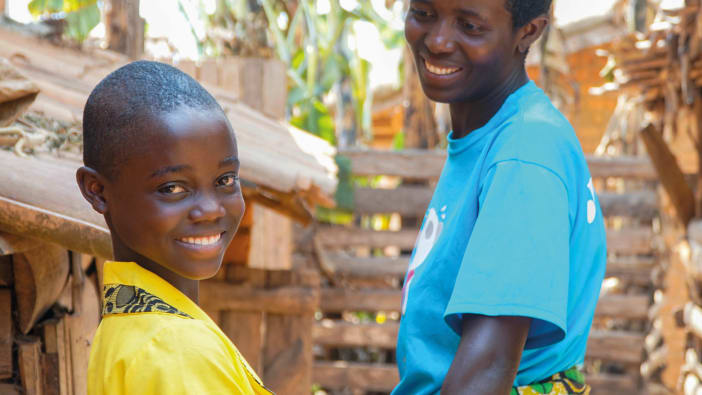by Pasteur Samuel Yameogo.
Burkina Faso is a land-locked country in West Africa with only one short rainy season. There are often severe food shortages in the drier northern areas. Since the 1980s when there were several years of famine, community grain banks have become popular throughout the country, providing a village-based solution to critical food shortages. Grain banks make food supplies available at the hardest times of the year at carefully controlled prices. ODE has supported the setting up of more than 100 grain banks.
The north-east of Burkina Faso is on the edge of the Sahara Desert, with sparse vegetation. The rainy season is between June and August. During this time, the lack of bridges makes roads impassable. The region therefore becomes isolated for several months each year. Food supplies cannot be transported from outside and commercial traders often exploit the resulting grain shortages, sometimes even inventing food shortages just to raise market prices. They control the markets, selling grains at high prices. Ateli and Matiacoali are examples of villages in this area.
Encouraging women's committees
Women’s groups with grain banks are usually less developed than those managed by men. The collection of grain often involves long journeys to other regions which have surplus grain, which is not easy for women. However, women’s committees have a number of advantages…
- Management committees are usually village-based because women travel less. there were several years of famine, community grain banks have become popular throughout the country, providing a village-based solution to critical food shortages. Grain banks make food supplies available at the hardest times of the year at carefully controlled prices. ODE has supported the setting up of more than 100 grain banks.
- Women are more ‘transparent’ in their financial management.
- Women have better skills in the management of food supplies, especially in times of crisis.
Conclusion
ODE are well satisfied because we feel that the main objective – of improving local food security – has been achieved. The experience of Ateli and Matiacoali reinforces our view that such small organisations can be very effective once they are aware of the problems of food security and united in finding solutions. Providing credit, training and technical advice is sufficient to enable them to manage their own food security. However, there is still a need to develop and build on experience.
Case Study One: The Matiacoali Grain Bank
Matiacoali is a large village with 3,200 people, situated on the edge of a tarmac road. It has a market used by more than twelve villages in the area. Food prices soar during the rainy season to well above what households can afford. This situation led to the forming of an association of women in the early 1990s to fight against the evils of food insecurity.
In 1992–3 a famine in this region brought in ODE to set up and run an urgent aid operation. During the famine, ODE sold grain at an affordable price (about one fifth of the market price). After the famine, money from this sale had to be used on a project to improve food security. The request of the women of Matiacoali for a grain bank was accepted.
A storehouse was built with the participation of the women’s association and a management team was selected for training. An ODE loan allowed them to stock 25 tonnes of grain.
Operation
Since 1994, the women's group of Matiacoali has stored grain for the critical periods of the year. Straight after harvest time, from December to February, the group tour the markets of the area, discovering where the price is best and stocking up the bank. Grain is sold in July and August, at prices everyone can afford, among the group’s members and the most needy households of the village. Two repayments of the loan have already been made. Since their initial training from ODE, the management committee has gained much practical knowledge and are now taking greater control of their own project.
Some problems
- A very good harvest in 1995 meant there were problems in selling all the grain, as people still had their own supplies. This meant the group had to sell part of its grain at purchase price to its members, reducing their profit margin to nothing. This made repayment difficult.
The negative influence of certain members reduced the overall motivation and achievements of this group.
The large size of the village makes the demand for grain difficult to satisfy, but at least the group can help part of the population.
Some solutions
- A new management committee has been appointed, which should improve motivation.
- The funds available for buying stock are still at a good level, but will be much weaker when the group finish repaying the loan. ODE has provided fresh credit, with lower interest this time. This may help them to increase their stock level so more people benefit from the grain bank.
Case Study Two: The Ateli Grain Bank
Ateli is a village of 1,000 people. The men of the village set up a group in 1982 during a time of famine. One of their objectives was to unite in the struggle for food self-sufficiency. The community grain bank project was begun in 1986 to improve food security. The group asked for help from ODE who agreed to provide the necessary credit to begin work. A well-built community grain store was constructed with the full participation of villagers.
Operation
A committee was selected to look after the management of the grain bank. Ateli chose well, forming a dynamic committee. They received training from ODE in grain storage and marketing. ODE provided credit to enable the purchase of grain at the end of the harvest season when prices are low. The credit was divided into two installments given over two successive years, in order to reduce risk in the first year. Ateli purchased 5 tonnes of grain in the first year and 5 tonnes in the second year.
Since 1988, Ateli has stored several types of grain in its grain bank. Grain prices are fixed by the village group to provide a balance between the low grain prices at the end of harvest and high grain prices charged by traders later in the year. When food is in short supply, grain is sold to villagers on a regular basis. Ateli has been able to pay back the loan in just four years.
Impact of the project
The villagers of Ateli have welcomed the grain bank warmly and understand the advantage of safeguarding their grain. During the three rainy months of the year, households easily survived the period of shortage thanks to their grain bank.
Some problems
- One difficulty has been bookwork. In this rural environment, the majority are illiterate. Management of the grain bank requires good record keeping.
- If grain is given on credit to help people during the most difficult periods, this brings the problem of recovering debts, which demands much patience on behalf of the committee.
- Since the loan was repaid, the bank can only operate with the slight profit they made during the five years of credit. This means they have difficulties buying enough grain in advance for all village households.
Some solutions
- The churches played an important role in teaching literacy and numeracy to enable better record keeping.
- To increase the buying power of grain banks, ODE offered to grant a fresh loan to all well managed grain banks, which included Ateli.
- ODE will continue to provide some follow-up and support for committees, even after loans are repaid, until they judge the organisation is sufficiently in control of the entire project.
Pasteur Samuel Yameogo is Director of ODE, a federation of evangelical churches in Burkina Faso committed to economic, social, cultural and spiritual development. ODE, 01 BP 108 Ouagadougou 01, Burkina Faso.









